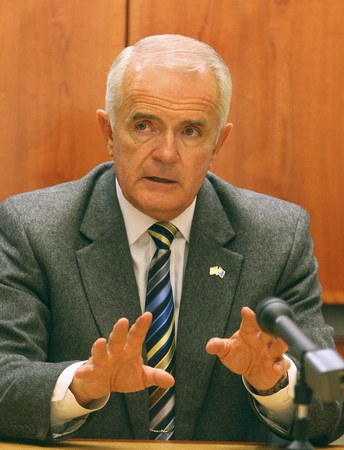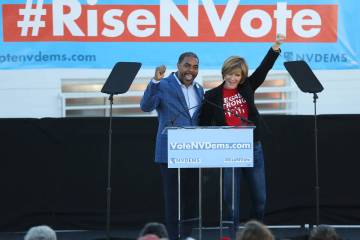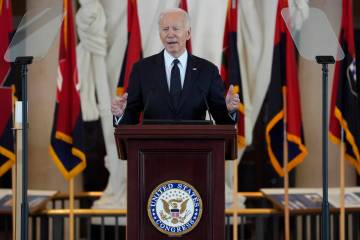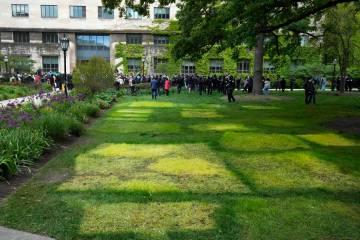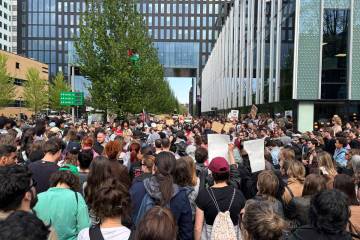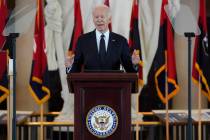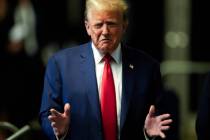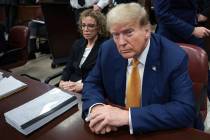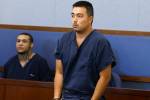Governor targets finance panel
The old fighter pilot can still spot a vulnerable target.
For two weeks, Gov. Jim Gibbons has attacked the Nevada Legislature's Interim Finance Committee, a group he says meets in violation of the state's constitution.
That had Gibbons, a decorated Air Force veteran who flew combat missions in Vietnam, throwing bombs at a sensitive subject in Carson City.
The governor used his bully pulpit earlier this month to amplify claims that the 40-year-old committee doesn't even have a right to exist.
If the argument were to gain steam, it could force state government to rewrite the way it does business.
Gibbons has already got the attention of longtime Interim Finance Committee member state Sen. Bill Raggio, R-Reno, who said his colleagues should make nice with the governor in part to preserve the status quo.
"Nobody has filed a formal challenge in the past," Raggio said.
"I don't think we should invite that."
On Friday Gibbons backed off the direct challenge when he tried to bypass the committee with an executive order to take control of federal funds coming to the state.
But he kept the door open to a constitutional challenge in the event the dispute escalates.
"It they are going to file a lawsuit against us, they are going to have to prove they have legal authority to exist," Gibbons spokesman Dan Burns said. "That will be very difficult or impossible to prove."
The subject is important because the committee makes financial decisions in between the 120-day legislative sessions that occur every other year.
Without that group to move money around to accommodate price increases, compensate for flawed revenue projections and cope with surprises, the entire Legislature could be called back to Carson City to settle every unexpected change in fiscal circumstances.
That's how Nevada did business before the committee was created in 1969 in an effort to streamline state government.
By creating the committee, the Legislature could make its policy, taxation and spending decisions during the regular session and go home. The committee stayed behind to guard the till and make adjustments based on requests from the Board of Examiners, a group that includes the governor, secretary of state and attorney general.
"Over the years it has been economical and practical to have these in lieu of having an annual session," Raggio said.
There's only one problem: the state constitution says any legislative action outside the 120-day legislative session, "is void, unless the legislative action is conducted during a special session convened by the Governor."
The discrepancy is no secret.
Almost since the committee was created, observers, and even members, have occasionally questioned the group's legitimacy.
"There are citizens who don't have their legislator voting on these things," said retired state archivist Guy Rocha. "I don't think it is quite taxation without representation, but it is budgeting without representation."
Rocha says the intellectually honest approach would be to hash out the legitimacy of the committee in court or go through the laborious process of changing the state constitution to have a legislative session every year so the committee isn't necessary.
"We need to overhaul all of this, raising this question about the IFC may in fact bring this to the fore, finally," Rocha said.
Former state Sen. Bob Beers, who also served on the committee, agreed with Rocha, to an extent.
Beers suggested breaking the 120-day biennial session into two annual 60-day sessions.
But he wasn't concerned that the potential illegitimacy of the committee was harmful.
"I don't think it is serious," Beers said. "They don't have the power to create taxes, so at the end of the day they rearrange stuff and have meetings."
The current brouhaha over the committee grew out of a recent decision by the group to defy Gibbons' plans for a proposed "stimulus czar" position.
Gibbons sought the committee's approval to add someone to his Cabinet to oversee tracking and distribution of up to $2.2 billion of federal money coming in from the $787 billion American Recovery and Reinvestment Act, or economic stimulus for short.
The committee, led by state Sen. Steven Horsford, D-Las Vegas, agreed that a so-called "stimulus czar" would be handy. But instead of approving money to pay a new Cabinet member, the group moved the job out from under the governor's control and under that of Controller Kim Wallin, a Democrat. It was a party-line vote and widely viewed as a slap at the governor.
Horsford said it was a simple matter of putting the job in the best place for the people.
He said Gibbons, a Republican plagued by personal and professional scandals throughout his tenure, isn't the right man to supervise the stimulus distribution.
Horsford disagreed with Raggio's suggestion of coming back to the table for a compromise that would put the whole dispute to rest.
"I believe it was a sound decision the IFC made," he said.
Even if Gibbons does continue to question the legitimacy of the committee, there's no guarantee he can actually undermine it.
Legislative Counsel Director Lorne Malkiewich said there are legal arguments to bolster the group's legitimacy.
Malkiewich said the restrictions that limit its scope show that it is merely carrying out duties designated during the 120-day session, not creating new legislation.
"That keeps it within a box that the delegation is defensible," he said.
And Rocha said Gibbons is a flawed choice to carry the anti-committee torch.
As a state legislator and throughout his gubernatorial term, Gibbons was silent on the subject until the committee disrupted his latest proposal to dole out stimulus money.
"It wasn't in his self-interest at the time," Rocha said of Gibbons' earlier career. "This should have been called long ago. I actually see his position, but I say, 'Jim, where were you all these other years?'"
Contact reporter Benjamin Spillman at bspillman@reviewjournal.com or 702-477-3861.



